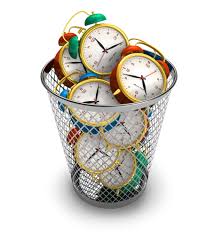You Waste Hours Each Week on Email Without Even Knowing It – Here’s How
How much time do you think you spend emailing each day? Each week? Chances are, it’s a bigger source of time expenditure than you realize. During each workday, the average worker spends 209 minutes checking their work email, and 143 minutes checking their personal email. In total, that’s nearly 6 hours per day.
Of course, there are some caveats to this figure. First, you’re likely checking email outside of work hours. Second, “checking” email doesn’t always require your full attention. Third, this doesn’t necessarily reflect the number of emails sent and received per day–but with the average worker sending and receiving 121 emails per day, 6 hours seems about right.
Email is an efficient and universally acknowledged communication medium, and for good reason; it’s fast, it’s cheap, and it leaves a permanent record. However, most people are wasting time due to their email habits, sometimes amounting to hours every week–and they don’t even realize it.
The Insidious Nature of Bad Email Habits
First, it’s important to understand the insidious nature of bad email habits. Email practices tend to be more destructive than other bad practices for two reasons: first, they’re hard to notice. Nobody calls you on your inefficient email habits the way they would bad data entry. Second, they multiply. A 30 second time loss seems like no big deal, but with 120 emails per day, that adds up to an hour of wasted time. Only by proactively scanning for opportunities to improve can you identify and eliminate these sources of time waste.
Unseen Bad Habits
Let’s look at some of the costliest ways you’re likely wasting time on email:
1. Notifications and distractions. Did you know it takes an average of 23 minutes to fully recover from a distraction? If you’re getting an email notification every few minutes that pulls your attention away, you’ll hypothetically never ramp up to full levels of focus. This is problematic, because most workers have email notifications on throughout the entire day, and they never realize how distracting those notifications are. Fortunately, there’s an easy solution: turn notifications off, whenever possible to do so, and especially when working on focus-intensive projects.
2. Obsessive checking. You can also suffer from obsessive email checking, even if you have notifications disabled. For example, you’ll stop what you’re doing every few minutes during the workday and outside of work to look for new messages. Chances are, this is a waste of your time–not to mention a major source of stress. Wean yourself from this habit by designating specific times to check your email, like once per hour or every two hours, depending on your career needs.
3. Excessively long messages. Long messages waste time in a few ways. They take longer to write, they’re harder to parse for concise meaning, and they invite longer responses. You can trim yours by getting to the point faster, splitting your paragraphs up, splitting long emails into multiple messages when necessary, and utilizing organizational tricks like bulleted lists.
4. Excessively short messages. Conversely, excessively short messages can also waste time. This may seem counterintuitive, since more concise messages tend to carry meaning more efficiently. However, if your messages are too short, they could likely be misinterpreted, or invite more inquiries, resulting in unnecessary time waste. And if you’re sending messages that don’t need to be sent, like “okay,” you’re spending unnecessary minutes.
5. Threads that just won’t die. Some people don’t know when to end an email thread. With upwards of a dozen people CC’d, thread participants will send messages back and forth endlessly, drifting into different topics eventually. This is painful not just because it’s distracting, and not just because it makes it harder to analyze the thread overall, but also because it’s creating problems for every single person on the thread.
6. Bad organization. How much time do you waste looking for a long-lost email, or an attachment you swore you had last week? If you’re not paying close attention to your organization, or if you don’t have an organization system in place at all, it’s going to cost you hours of time.
7. Poor use of the medium. Email is a great communication channel, but it’s foolish to use it as your only communication channel. It has strengths and weaknesses, like every other mode of communication. If you’re trying to solve a complex problem, if you’re trying to wrangle a dialogue between many participants, or if you’re disclosing something sensitive, you’re better off speaking over the phone or in person. Even attempting email as an initial point of entry can be a waste of time.
If you’re guilty of these bad email habits, don’t feel bad; most of us are, in one form or another. But once you understand them, you can keep an eye out for them, and devise strategies to counteract or minimize them. Be critical and aware of your email habits, and keep evolving toward greater efficiency.
Published on: Feb 5, 2020 By Larry Alton Independent business consultant@LarryAlton3 Inc.com
